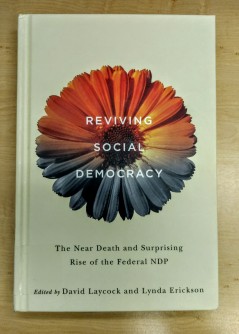Reviving Social Democracy: The Near Death and Surprising Rise of the Federal NDP by David Laycock and Lynda Erickson
 The 2015 Canadian federal election was a big one for those on the political left. Prime Minister Stephen Harper’s administration had been in power for nine years after consolidating the political right into one party, the Conservative Party of Canada. In the lead up to the election, this book was written to outline the history of the federal NDP and to study the way forward.
The 2015 Canadian federal election was a big one for those on the political left. Prime Minister Stephen Harper’s administration had been in power for nine years after consolidating the political right into one party, the Conservative Party of Canada. In the lead up to the election, this book was written to outline the history of the federal NDP and to study the way forward.
The federal NDP, despite their almost 60 year history, have never formed a government. The NDP have struggled to distance themselves from their beginnings as a fringe, far left labour party, in the face of more dominant, larger parties. In its 50 year history, the NDP, lead by the charismatic Jack Layton, became the Official Opposition for the first time after a landslide election in 2011. Through many election cycles, each bearing rises and troughs, the federal NDP saw the “Orange Crush” elevate the party into a legitimate contender in Canadian politics.
This incredibly informative and insightful book uncovers the many factors that led to the NDP’s success in the 2011 election, and how the party can further address the many issues it still faces. The book demonstrates that the following factors affected the 2011 results; successful campaigning/advertising, addressing regional issues in Quebec and Western Canada, a long term party shift to the centre, changing national political dynamics, and the selection of a strong, inspiring leader.
The book is part political history and part political science analysis. This is a book, not just for those interested in the NDP, but for anyone who is interested in Canadian politics and the many variables that affect a federal election campaign.
I would rate the book an 8/10 because of the thorough in-depth analysis and insight that it puts forward. Reviving Social Democracy brings forward some seriously great observations on Canadian politics that can be enjoyed by anyone on the political spectrum.
I would, however, like to warn potential readers that the middle part of the book is incredibly academic, and delves into complex election data analysis that contributed to the conclusions it presents. I wouldn’t say the book is totally accessible to someone who is not used to academic reading, but if you’re passionate about the topic you should be able to find it insightful. Everything is explained properly within the text, but it can be very dense at times.
The book, having been written before the 2015 federal election, cannot offer a perspective on the succeeding events, so I’d like to build on the book’s analysis with my own opinions. A lot of political pundits mostly attribute the 2011 election success of the NDP explicitly to the leadership of Jack Layton. His untimely death and the subsequent flop in the 2015 election, where the NDP only captured 44 seats in Parliament (compared to their previous 103), is proof for many observers that the federal NDP’s 2011 success was an anomaly attributed to one factor only; the charisma of Layton. However, what’s interesting is that the book successfully argues how the 2011 election was due to a much larger confluence of factors than people give credit for. I would argue that many of the positions and recommendations taken within the book were not correctly followed by Thomas Mulcair’s leadership of the federal NDP and that there is still a great opportunity for the party to gain success in Canada’s political landscape. For those who identify as an NDP supporter and were let down by the results of the 2015 election, fear not. There is still potential for another “orange resurgence”. Despite the political situation down south with the success of a populist, right-wing movement, I’d argue Canada is an entirely different beast. There is still room for a politically progressive, left wing party and I would recommend those in the federal NDP party seriously consider the conclusions of this incredible book.
Thanks for reading this week!
P.S. for those who align themselves more on the political right, in the coming weeks/months I’ll be reviewing a book called Radical Tories by Charles Taylor that may be more up your alley.